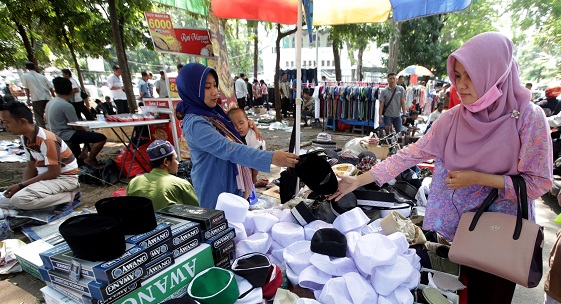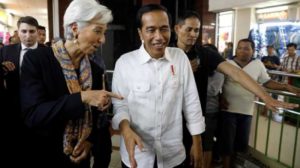IMF..jpg" />
Vendor sells kopiah (Indonesian fez) in downtown market in Jakarta, Indonesia. Private consumption is a large driver of economic growth for the country, says IMF. EPA photo.
Jakarta, 07 Jumadil Awwal 1438/04 February 2017 (MINA) – Indonesia’s economy continues to register strong growth, thanks in large part to solid economic policies and increased household consumption, says the IMF in its latest report.
Also Read: Saudi Arabia Wins Bid to Host World Expo 2030
The country’s growth at 5 percent for 2016—up from 4.8 percent in 2015—remains among the highest in large emerging market economies.
Household consumption—one of the main drivers of growth for Indonesia—is strengthening due to people’s improving purchasing power amid low inflation and a stronger rupiah.
Still, while strong household consumption should continue to support growth, Indonesia needs more investment to sustain and even accelerate the pace over the medium term.
Continuing with reforms
The government has already started to implement reforms to improve the investment climate and boost growth.
Also Read: 148 Products from Indonesia Promoted at Sarawat Superstore Jeddah
These include expanding investment in public infrastructure, reducing the layers of government regulations, and opening up new areas of the economy to private investment
The government’s strategy to strengthen tax collection and broaden the tax base through tax reform will also generate additional revenues to pay for priority government investment.
Indonesia’s youthful workforce has the potential to be one of the country’s most powerful economic levers.
Reforms that can help narrow the skills gaps between what employers need and what employees have—such as expanding vocational training opportunities — can help strengthen the economy’s productivity.
Current shifts in the global economy
Also Read: Packaging Industry Supports Halal Ecosystem
Indonesia’s positive economic outlook, however, is challenged by global uncertainties, including around policies from the new United States administration, and the possible impact from China’s rebalancing and expected economic slowdown.
To best adapt to this new environment, the country needs to stand ready to manage short-term risks and, at the same time, ramp up economic reforms to increase potential growth, the report says. (T/RS05/RS01)
Mi’raj Islamic News Agecy (MINA)
Also Read: Indonesia-Japan Agree on Energy Transition Cooperation


























 Mina Indonesia
Mina Indonesia Mina Arabic
Mina Arabic